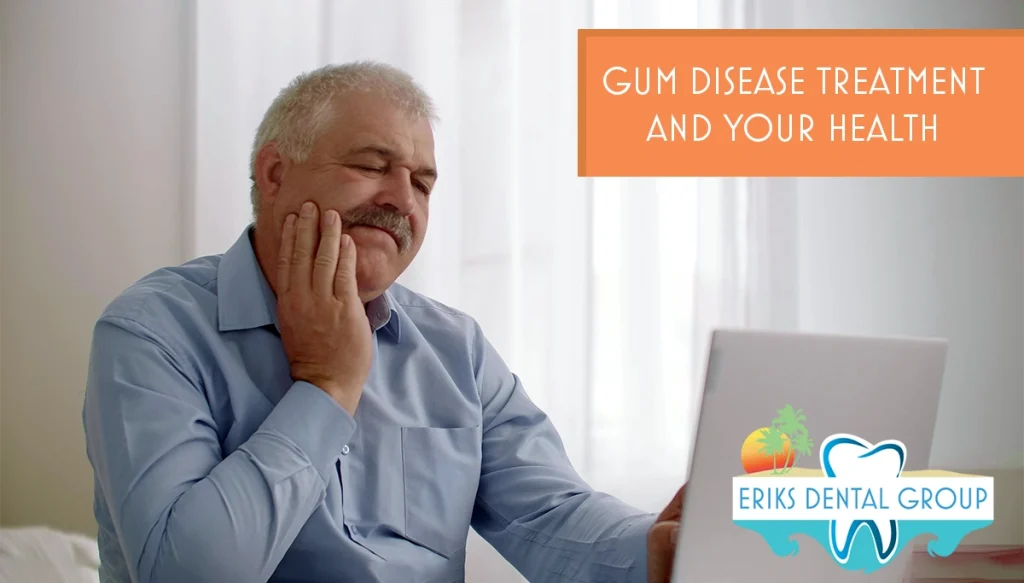Gum disease, also known as periodontitis, is an infection that occurs in the tissue that holds and supports your teeth, your gums! It can be caused by a variety of reasons, such as a buildup of plaque, smoking, and poor oral hygiene habits, such as not brushing or flossing properly or often.
There are two main stages to gum disease: the first being gingivitis, and the second main stage is periodontitis. Keep reading as we discuss both stages and explain what to expect from your gum disease treatment plan.
Gingivitis
This is the early stage of gum disease, which can cause your gums to be red, swollen, and bleed easily. However, if this stage is caught early and treated, it is easily reversible, especially if you put in consistent proper care and keep up with maintenance.
Symptoms
- Easily bleeding gums during flossing and brushing teeth
- Red and puffy gums
- Gums hurt to push
- Bad breath
Causes
- Poor oral hygiene habits
- Plaque build up
- Smoking
- Diabetes
- Hormonal changes, for example, pregnancy
What To Do?
- Brush teeth twice a day
- Floss
- Visit the dentist for checkups and cleaning
- Use a mouthwash
- Maintain proper oral hygiene habits
Periodontitis
If gingivitis is not treated, it leads to periodontitis. When gum disease reaches this level, it then causes damage to your gums and bones supporting your teeth.
Symptoms
- Receding gums
- Persistent bad breath
- Loose or separating teeth
- Sensitive teeth
- Pain while chewing
- Bleeding while brushing or flossing
Causes
- Untreated gingivitis
- Plaque and tartar build up on teeth and gums
- Smoking
- Poor oral hygiene habits
What To Do?
- Schedule an appointment with your dentist
- Make sure you are getting regular cleanings and checkups
- Maintain proper oral hygiene and care after treatment
If you notice any of the above, it is time to book an appointment. The sooner gum disease is diagnosed, the easier it is to treat.
The Three Stages Of Periodontitis
There are three main stages, mild periodontitis, moderate periodontitis, and advanced periodontitis.
Mild Periodontitis
- Gums begin to pull away from teeth
- Some bone loss may start to occur
- Bleeding and swelling gums
Moderate Periodontitis
- Deeper pockets form around teeth, which lets bacteria in
- More bone loss
- Gum recession
- Bad breath
Advanced Periodontitis
- Severe bone and gum loss
- Teeth may start to loosen or even fall out
- Pain while eating
Without proper care, gum disease can only become worse over time. However, the good news about gum disease is that when caught early and treated properly, gum disease treatment is highly effective in the early stages.
Affecting More Than Your Gums
Getting gum disease treatment is not only important for the health of your gums and teeth, it is also vital to making sure the rest of your body, such as your heart, lungs, and brain, all stay healthy. Untreated gum disease can increase inflammation throughout your body and lead to serious complications.
Lungs
Gum disease bacteria can travel to your lungs through saliva or the bloodstream. This increases your risk of respiratory issues and lung infections.
- Gum bacteria can be inhaled into the lungs
- Can increase the risk of pneumonia
- Worsen conditions such as chronic obstructive pulmonary disease, COPD
- More frequent asthma attacks
- Reduces lung function over time
Heart
There is a strong link between gum disease and heart health. Bacteria and inflammation from infected gums can damage your arteries and heart over time.
- Increase your risk of a heart attack
- Is linked to clogged arteries
- Bacteria from infected gums can enter the bloodstream
- Inflammation can harden arteries (atherosclerosis)
- Can worsen any preexisting heart conditions
- Increases the risk of endocarditis, an infection of the heart lining
Brain
Poor gum health has been associated with cognitive decline and memory issues; gum disease bacteria and inflammation may affect brain health as you age.
- Increased risk of Alzheimer’s disease
- Impact your memory and focus
- Gum disease can speed up the cognitive decline found in elderly people
Mental Health
Chronic oral health issues can take a toll on more than your physical health; it can have severe negative impacts on your emotional well-being.
Gum disease may lead to:
- Embarrassment from bad breath
- Self-conscious about visible gum recession
- Low self-esteem
Getting proper gum disease treatment can help restore confidence and reduce stress around your health and appearance.
Gum Disease Treatment Options

When it comes down to getting gum disease treatment, there are two different routes you can take: surgical or non-surgical.
The following are a couple of points to help you decide which option would be best for you and your situation, as the right treatment for you depends on what stage of gum disease you have.
Non-Surgical Treatments
Laser Periodontal Therapy
- Less invasive gum disease treatment option
- Does not require any incisions to be made
Antibiotics
- Less invasive option for treating infected gum tissue
- Helps eliminate bacterial infection in gums
- Often used alongside other treatments
Scaling
- Smooths the tooth root to help and encourage healing
- Removes any plaque and tartar from deeper pockets below the gumline
- You may be given local anesthesia
Dental Prophylaxis
- Removes the plaque and tartar above and below your gums
- It is recommended twice a year
- Prophylaxis helps to get rid of gingivitis in the early stages
Surgical Treatments
Pocket Reduction Surgery
- Also known as flap surgery
- Helps stop the spread of bacteria
- Makes cleaning gums easier
- Gums are lifted to remove tartar and bacteria below the gumline
- Deep pockets are reduced to prevent further infection
- Reduces the risk of bone and tooth loss
Bone Grafting
- Bone is added to areas with significant loss
- Helps anchor loose teeth
- Often combined with pocket reduction surgery
Gum Grafting
- Tissue is taken from the roof of your mouth or a donor
- Grafted over areas of gum loss
- Promotes a healthier gum structure
All methods and steps in gum disease treatment are designed to stop the infection, heal your gums, and prevent any further damage from happening. Make sure to talk to your dentist to pick the right treatment option for you.
Getting Treatment Early
Treating gum disease early can help you avoid:
- Tooth loss
- Bone loss
- Gum recession
- Painful infections
- Expensive dental procedures
- Prevent health complications
- Boost confidence
- Improve overall wellness
Daily Habits That Support Gum Health

To prevent gum disease or maintain your results after treatment:
- Brush your teeth twice a day for at least two minutes
- Floss daily to remove any plaque
- Avoid smoking
- Visit and make appointments with your dentist regularly
Gum Disease Treatment In Boynton Beach Florida
Gum disease does not go away on its own. The longer it is left untreated, the more damage it can cause to your mouth and your body.
Whether you are experiencing symptoms and think you need some form of gum disease treatment, or just want to stay ahead of problems, taking action now can help you avoid painful complications later. Call Eriks Dental Group today at 561-733-4004 to schedule your appointment.
Let’s work together to keep your smile strong, your gums healthy, and your whole body thriving.

